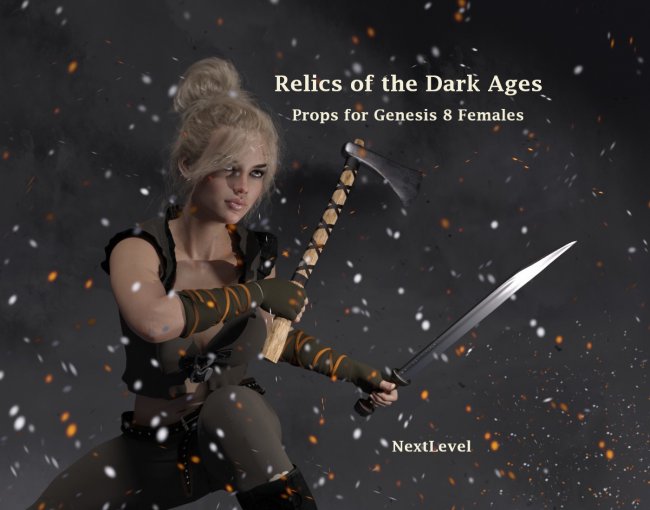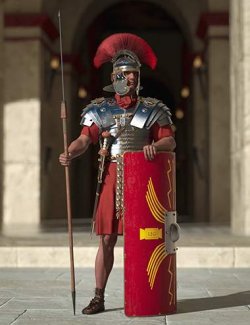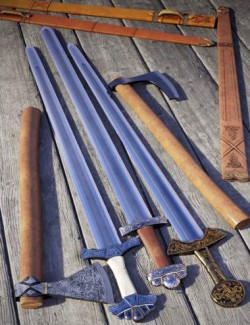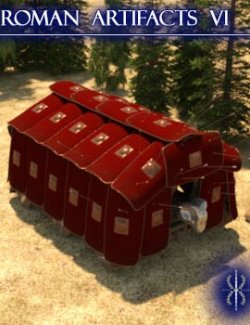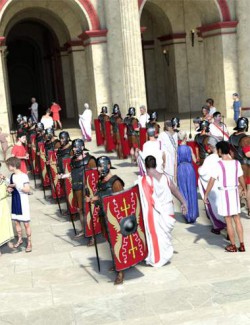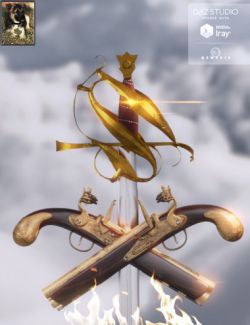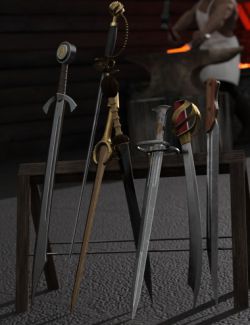Dark Skies. Grey clouds. Black Horizons. The Dark Ages stretched from roughly 400 to 900 AD; they were Europe's most dreadful and ruinous centuries. The light, ingenuity, and civility of Roman antiquity are long gone. From Italy to Spain, France to Germany, and from Scandinavia to the British Isles, the lands were bloodied by barbarians for centuries. The only glimmer of hope during these dark times was the pale sunlight reflecting off of your weapon's rough iron. You would need to keep that weapon close in order to survive.
Relics of the Dark Ages are NextLevel's most intricatley crafted G8F props since Aegis Sword III. Six Dark Age weapons are included:
1. Anglo-Saxon Langseax:
The short Langseax was commonly found in Dark Age gravesites all over Southeastern England. It could be used in battle, though it was primarily used for self-defense from brigands and raiders, especially in the English coastal towns and villages when defending against Viking Berserkers.
2. Frankish Throwing Axe:
The mainstay of Frankish soldiers in France and Germany during the Merovingian and Carolingian dynasties. Used with deadly effectiveness at the Battle of Poitiers by Charles Martel's soldiers against the invading Umayyad Arabs. The Frankish victories at Tours and Poitiers are widely accepted as having prevented total Arab domination of Western Europe. The throwing axe could be used for ranged combat or for close combat.
3. Lombard Sword:
The primary weapon of wealthy Lombard nobles in Italy. The common soldier could often not afford such a weapon, so this sword was often used for show and rarely used in battle. Though it was still carried by the Lombards after they surrendered to Charlemagne's Frankish armies, thus forging the Holy Roman Empire which spanned Italy, Germany, France, northern Spain, and the Low Countries. The rule of Charlemagne is loosely considered to be the beginning of the end of the Dark Ages.
4. Pictish Spear:
The common spear was perhaps the most prolific weapon of the Dark Ages. Though none used it more predominantly than the Picts of Scotland. First wielded by the ancestors of the Picts who often charged into battle with their skin painted; the Picts presumably wiped out and annihilated the entire Roman 9th Legion after the Legion marched north of Hadrian's Wall. The Legion disappeared without any historical trace, and the famed standard of the 9th Legion has not been found to this day.
5. Viking Seax:
Found among Viking settlements throughout Northern and Western Europe, the Seax-style sword was originally introduced to Eastern and Central Europe by the encroaching Hunnic hordes from Eurasia. Adopted by the Vandals and Ostrogoths, the Seax eventually reached Scandinavia (modern Denmark, Norway, and Sweeden). Refined in the Scandinavian style, it was used in coastal raids all over Europe for centuries. These Viking raiders became so fierce and so coordinated, that local chieftans, nobles, and even kings had to pay tribute to the Vikings to prevent them from ravaging their coastal regions.
6. Visigothic Burial Spatha:
The Visigoths of Central Spain and Southern France adopted the Spatha from the Western Roman Empire, and added their unique craftmanship to it. A large sword that was wielded by cavalry and high-ranking infantryman to cleave the enemy apart. It was used in battle until the Umayyad Caliphate Conquest of Spain around 700 AD, after which the Visigothic Kingdom ceased to exist.
Add your own spin to the Dark Ages; arm your Genesis 8 Females with these fantastic weapons, create stunning renders, and re-write history. But this time, let the women do it...
Software:
DAZ Studio 4.9.4 (Needed for G8F/M)
Compatible figures: Genesis 8 Female
